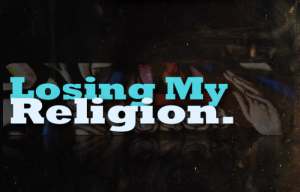Tullian Tchividjian's Blog, page 31
October 14, 2011
Then I Will Go With You
I close the my book Surprised by Grace: God's Relentless Pursuit of Rebels with a story (not sure if this really happened or is simply parabolic) from Civil War days before America's slaves were freed, about a northerner who went to a slave auction and purchased a young slave girl. As they walked away from the auction, the man turned to the girl and told her, "You're free."
With amazement she responded, "You mean, I'm free to do whatever I want?"
"Yes," he said.
"And to say whatever I want to say?"
"Yes, anything."
"And to be whatever I want to be?"
"Yep."
"And even go wherever I want to go?"
"Yes," he answered with a smile. "You're free to go wherever you'd like."
She looked at him intently and replied, "Then I will go with you."
Some fear that grace-delivered, blood-bought, radical freedom will result in loveless license. But as the above story illustrates, redeeming unconditional love alone (not fear, not guilt, not shame) carries the power to compel heart-felt loyalty to the One who bought us (2 Corinthians 5:14).
October 11, 2011
Grace Without Buts And Brakes
 When people talk about grace, listen carefully. I've listened long enough to listen for certain things. I listen for "buts and brakes." We often speak about grace with a thousand qualifications which reveal a paralyzing fear that grace will be taken too far. Our greatest concern, it seems, is that people will take advantage of grace and use it as a justification to live licentiously. And since bad behavior is apparently the thing that scares us the most as preachers and parents, we end up saying more about what grace isn't than we do about what grace is.
When people talk about grace, listen carefully. I've listened long enough to listen for certain things. I listen for "buts and brakes." We often speak about grace with a thousand qualifications which reveal a paralyzing fear that grace will be taken too far. Our greatest concern, it seems, is that people will take advantage of grace and use it as a justification to live licentiously. And since bad behavior is apparently the thing that scares us the most as preachers and parents, we end up saying more about what grace isn't than we do about what grace is.
Matt Richard describes well how naturally we take it upon ourselves to reign grace in when we fear too much of it will result in lawlessness:
I have found that as Christians we many times attribute 'lawlessness' to the preaching of the Gospel. Somewhere in our thinking we rationalize that if the Gospel is presented as "too free, too unconditional or that Jesus fulfills the law for us" that the result will be lax morality, loose living and lawlessness. It is as if we believe that the freeing message of the Gospel actually produces, encourages and grants people a license to sin. Because of this rationalization we find ourselves strapping, holding and attaching restrictions to the Gospel so that we might prevent or limit lawlessness. In other words, the Gospel is placed into bondage due to our rationalization and reaction to lawlessness.
The truth, whether we admit it or not, is that grace scares us to death. It scares us primarily because it wrestles control and manageability out of our hands–introducing chaos and freedom. And so we find creative ways to qualify it. We speak and live with a "yes grace, but" tone. We're afraid to simply let it be as drastically unsafe, unconditional, uncontrollable, unpredictable, and undomesticated as it truly is.
That's one reason why I am rejoicing over my friend Dane Ortlund's new book Defiant Grace. Dane has written a book on grace with no "buts and brakes." He's a fearless writer and scholar who rightly acknowledges the unsettling, messy, counter-intuitive nature of amazing grace–"beyond price and yet totally free." In the introduction he writes:
For the grace that comes to us in Jesus Christ is not measured. This grace refuses to allow itself to be tethered to our innate sense of fairness, reciprocity, and balancing of the scales. It is defiant…However much we may laud grace with our lips, our hearts are so thoroughly law-marinated that the Christian life must be, at core, one of continually bathing our hearts and minds in gospel grace. We are addicted to law. Conforming our lives to a moral framework, playing by the rules, meeting a minimum standard—this feels normal. And it is how we naturally medicate that deep sense of inadequacy within. The real question is not how to avoid becoming a Pharisee; the question is how to recover from being the Pharisee we already, from the womb, are.
Law feels safe. Grace feels risky. Rule-keeping breeds a sense of manageability; grace feels like moral vertigo. After all, if all that we are is by grace, there is no limit to what God can ask of us. But if some corner of our virtue is due to personal contribution, there is a ceiling on what God can ask of us. He can bring us only so far. He can only ask so much.
Such is not the call of Christ. The Jesus of the Gospels defies our domesticated, play-by-the-rules morality. It was the most extravagant sinners of Jesus' day who received his most compassionate welcome; it was the most scrupulous law-abiders who received his most searing denunciation. The point is not that we should therefore take up sin. The point is that we should lay down the silly insistence on leveraging our sense of self-worth with an ongoing moral record. Better a life of sin with penitence than a life of obedience without it.
It is time to enjoy grace anew. Not the decaffeinated grace that pats us on the hand, ignores our deepest rebellions, and doesn't change us, but the high-octane grace that takes our conscience by the scruff of the neck and breathes new life into us with a pardon so scandalous that we cannot help but be changed. It's time to blow aside the hazy cloud of condemnation that hangs over us throughout the day with the strong wind of gospel grace. "You are not under law but under grace" (Rom 6:14). Jesus is real, grace is defiant, life is short, risk is good. For many of us the time has come to abandon once and for all our play-it-safe, toe-dabbling Christianity and dive in. It is time, as Robert Farrar Capon put it, to get drunk on grace. Two hundred-proof, defiant grace.
Pure gold, huh? I think so.
So, as you listen to people talk about grace, here's a good litmus test: listen for the "but." You won't hear it in Dane's book. You won't feel the tapping of the brakes and you won't see a list of qualifications. What you'll encounter is "grace unmeasured, vast and free." It'll frighten you and free you at the same time. After all, that's what grace does.
As I've said before: whether it's a sermon, a book, a blog post, or a tweet-if the lasting impression you get causes you to focus more on what you must do than on what Christ has done, the gospel of grace has not been communicated and the communicator (albeit, unwittingly) is no better than the Pharisees who were charged by Jesus with "tying up heavy burdens, hard to bear, and laying them on people's shoulders" (Matthew 23:4). Beware of preaching that, in the words of Herman Bavinck, "acknowledges that we are justified by the righteousness of Christ but then seems to think that we are then sanctified by a holiness we ourselves have acquired." It is through the preaching of grace that Jesus summons sinners (both Christians and non-Christians) and says, "Come to me, all who labor and are heavy laden, and I will give you rest. Take my yoke upon you, and learn from me, for I am gentle and lowly in heart, and you will find rest for your souls" (Matthew 11:28-29). The difference between "religion" and the gospel of grace is that religion gives burdens by announcing that Jesus plus something equals everything while the gospel of grace absorbs burdens announcing that Jesus plus nothing equals everything.
Thanks, Dane, for reminding us of this without flinching!
October 7, 2011
Law Without Gospel Leads To Licentiousness
 I received this letter a few weeks ago from someone I've never met. He sent it to me as a word of encouragement regarding how the message of grace has revitalized his love for God. I hesitated to post it because, given the kind things he says about my work, I didn't want to appear self-promotional. But what he says about the effect of grace in revitalizing his spiritual life and the inability of the law to engender what it commands is so good, I just had to share it with you.
I received this letter a few weeks ago from someone I've never met. He sent it to me as a word of encouragement regarding how the message of grace has revitalized his love for God. I hesitated to post it because, given the kind things he says about my work, I didn't want to appear self-promotional. But what he says about the effect of grace in revitalizing his spiritual life and the inability of the law to engender what it commands is so good, I just had to share it with you.
He wrote:
Over the last couple of years, we have really been struggling with the preaching in our church as it has been very law laden and borders on moralistic. After listening, I feel condemned with no power to overcome my lack of ability to obey the law. Over the last several months, I have found myself very spiritually depressed, to the point where I had no desire to even attend church.
We don't have an evening service so we started listening to sermons as a family on Sunday evenings on the Internet. (We have 4 children, with another due on Monday!). We have listened to part of your "Pictures of Grace" sermons on your church website over the past few weeks. Additionally, we have been reading your blog. I just want to thank you for your commitment, and faithfulness to the gospel of grace. Since reading your blog and listening to your sermons, it is like a fresh ocean breeze blowing through my face. You rightly put the focus on the finished, completed work of Christ, and point us away from ourselves. I have found myself gradually crawling out of my spiritual depression and wanting to do the things God has called me to do. This isn't a result of more law in my life, but more gospel.
Grace is not dependent on anything, and if it is, then it wouldn't be grace! Pastors are so concerned about somehow preaching "too much grace" (as if that is possible) as they wrongly believe that type of preaching leads to antinomianism or licentiousness. But, I can testify that the opposite is actually true. I believe preaching only the law, and giving little to no gospel, actually leads to antinomianism. When mainly law is preached, in my opinion, that leads to the realization that I can't follow it, so I might as well quit trying. When the remedy to the law (gospel) is not presented, the hearer is left without any power to perform good works. Only the gospel gives the power to obey. I know what to do; I need the power to do it.
The ironic thing about legalism is that it not only doesn't make people work harder, it makes them give up. Moralism doesn't produce morality; rather, it produces immorality. We make a big mistake when we conclude that the law is THE answer to licentiousness. In fact, the law alone stirs up licentiousness. People get worse, not better, when you lay down the law.
 To be sure, the Spirit does use the whole Word in our sanctification: the law as well as the gospel. But the law and the gospel do very different things. The law reveals sin but is powerless to remove sin. It points to righteousness but can't produce it. It shows us what godliness is, but it cannot make us godly. As Martin Luther said, "Sin is not canceled by lawful living, for no person is able to live up to the Law. Nothing can take away sin except the grace of God." The law is impotent–it has no strength, it has no power, it offers us nothing. Sinners already are powerless to obey the demands of the law, and the law offers them no assistance–absolutely none.
To be sure, the Spirit does use the whole Word in our sanctification: the law as well as the gospel. But the law and the gospel do very different things. The law reveals sin but is powerless to remove sin. It points to righteousness but can't produce it. It shows us what godliness is, but it cannot make us godly. As Martin Luther said, "Sin is not canceled by lawful living, for no person is able to live up to the Law. Nothing can take away sin except the grace of God." The law is impotent–it has no strength, it has no power, it offers us nothing. Sinners already are powerless to obey the demands of the law, and the law offers them no assistance–absolutely none.
The law apart from the gospel can only crush; it can't cure.
The law could promise life to me,
If my obedience perfect be;
But grace does promise life upon
My Lord's obedience alone.
The law says, Do, and life you'll win;
But grace says, Live, for all is done;
The former cannot ease my grief,
The latter yields me full relief. (Ralph Erskine, 1745)
So, the law serves us by showing us how to love God and others. But we fail to do this every day. And when we fail, it is the gospel which brings comfort by reminding us that God's infinite approval of us doesn't depend on our keeping of the law but on Christ's keeping of the law for us. And guess what? This makes me want to obey him more, not less! As Spurgeon wrote, "When I thought God was hard, I found it easy to sin; but when I found God so kind, so good, so overflowing with compassion, I smote upon my breast to think that I could ever have rebelled against One who loved me so, and sought my good."
Indeed, it is "the kindness of the Lord that leads to repentance" (Romans 2:4).
October 3, 2011
Presumption Produces Self-Deception
 "For if anyone thinks he is something, when he is nothing, he deceives himself." (Galatians 6:3)
"For if anyone thinks he is something, when he is nothing, he deceives himself." (Galatians 6:3)
Last week in this post I made the point that regardless of how well I think I'm doing in the sanctification project or how much progress I think I've made since I first became a Christian, like Paul in Romans 7, when God's perfect law becomes the standard and not "how much I've improved over the years", I realize that I'm a lot worse than I fancy myself to be. Whatever I think my greatest vice is, God's law shows me that my situation is much graver: if I think it's anger, the law shows me that it's actually murder; if I think it's lust, the law shows me that it's actually adultery; if I think it's impatience, the law shows me that it's actually idolatry (read Matthew 5:17-48).
We'll always maintain a posture of suspicion regarding the radicality and hilarity of unconditional grace as long as we think we're basically OK. Our presumption of "okayness" leads to a self-deception that robs us of the joy of our salvation and the undomesticated freedom that Christ paid so dearly to secure for sinners like me.
Martin Luther shows how probing the problem of presumption is and reveals that our so-called progress may not be as impressive as we think it is:
Presumption follows when a man sets himself to fulfill the Law with works and diligently sees to it that he does what the letter of the Law asks him to do. He serves God, does not swear, honors father and mother, does not kill, does not commit adultery, and the like. Meanwhile, however, he does not observe his heart, does not note the reason why he is leading such a good life. He does not see that he is merely covering the old hypocrite in his heart with such a beautiful life. For, if he looked at himself aright–at his own heart–he would discover that he is doing all these things with dislike and out of compulsion; that he fears hell or seeks heaven, if not also for more insignificant matters: honor, goods, health; and that he is motivated by the fear of shame or harm or diseases. In short, he would have to confess that he would rather lead a different life if the consequence of such a life did not deter him; for he would not do it merely for the sake of the Law. But because he does not see this bad reason, he lives on in security, looks only at the works, not into the heart, and so assumes that he is keeping the Law of God well. (Luther's Works, St. Louis edition, 11:81 ff)
The Heidelberg Catechism also puts things in perspective:
Question 62: But why cannot our good works be the whole, or part, of our righteousness before God?
Answer: Because, the righteousness which can be approved of before the tribunal of God, must be absolutely perfect, and in all respects conformable to the divine law; and also, that our best works in this life are all imperfect and defiled with sin.
"At the cross", says Gerhard Forde, "God stormed the last bastion of the self, the last presumption that you were going to do something for him." Genuine freedom awaits all who stop trusting in their own work and start trusting in Christ's work.
"Life Without God: Part 7″ | Pastor Tullian | October 2, 2011 from Coral Ridge on Vimeo.
September 30, 2011
The End Of Control Is The Beginning Of Freedom
 There's nothing more difficult for us to get our minds around than the unconditional grace of God; it offends our deepest sensibilities. Conditionality is much safer than unconditionality because conditionality keeps us in control, it's formulaic-do certain things and certain things are guaranteed to happen (this is why parents and preachers have such a hard time with grace–trust me, I know. I'm both a parent and a preacher). We understand conditions. Conditionality makes sense. Unconditionality on the other hand is incomprehensible to us. We are so conditioned against unconditionality because we are told in a thousand different ways that accomplishment precedes acceptance; that achievement precedes approval.
There's nothing more difficult for us to get our minds around than the unconditional grace of God; it offends our deepest sensibilities. Conditionality is much safer than unconditionality because conditionality keeps us in control, it's formulaic-do certain things and certain things are guaranteed to happen (this is why parents and preachers have such a hard time with grace–trust me, I know. I'm both a parent and a preacher). We understand conditions. Conditionality makes sense. Unconditionality on the other hand is incomprehensible to us. We are so conditioned against unconditionality because we are told in a thousand different ways that accomplishment precedes acceptance; that achievement precedes approval.
Everything in our world demands two way love. Everything's conditional: if you achieve only then will you receive meaning, security, respect, love and so on. But grace is otherworldly because it's unconditional–it is one way love: "Grace is love that seeks you out when you have nothing to give in return. Grace is love coming at you that has nothing to do with you. Grace is being loved when you are unlovable" (Paul Zahl).
Like Job's friends, we naturally conclude that good people get good stuff and bad people get bad stuff (we preach and parent this way). The idea that bad people get good stuff is thickly counter-intuitive. It seems terribly unfair. It offends our sense of justice (we so quickly forget that the Bible is not a record of good people earning God's blessings, but a record of bad people receiving God's blessings because Jesus earned them for us).
 Even those of us who have tasted the radical saving grace of God find it intuitively difficult not to put conditions on grace- "don't take it too far; keep it balanced." The truth is, however, that a "yes grace but" posture is the kind of posture that perpetuates slavery in our lives and in the church. Grace is radically unbalanced. It has no "but": it's unconditional, uncontrollable, unpredictable, and undomesticated. As Doug Wilson put it recently, "Grace is wild. Grace unsettles everything. Grace overflows the banks. Grace messes up your hair. Grace is not tame. In fact, unless we are making the devout nervous, we are not preaching grace as we ought." Grace scares us to death because in every way it wrestles control out of our hands. However much we hate law, we are more afraid of grace.
Even those of us who have tasted the radical saving grace of God find it intuitively difficult not to put conditions on grace- "don't take it too far; keep it balanced." The truth is, however, that a "yes grace but" posture is the kind of posture that perpetuates slavery in our lives and in the church. Grace is radically unbalanced. It has no "but": it's unconditional, uncontrollable, unpredictable, and undomesticated. As Doug Wilson put it recently, "Grace is wild. Grace unsettles everything. Grace overflows the banks. Grace messes up your hair. Grace is not tame. In fact, unless we are making the devout nervous, we are not preaching grace as we ought." Grace scares us to death because in every way it wrestles control out of our hands. However much we hate law, we are more afraid of grace.
I've posted these explosive words from Gerhard Forde before, but they're worth posting again because he so aptly puts his finger on why we so naturally react the way we do when the gospel of God's unconditional grace is considered:
The gospel of justification by faith is such a shocker, such an explosion, because it is an absolutely unconditional promise. It is not an "if-then" kind of statement, but a "because-therefore" pronouncement: because Jesus died and rose, your sins are forgiven and you are righteous in the sight of God! It bursts in upon our little world all shut up and barricaded behind our accustomed conditional thinking as some strange comet from goodness-knows-where, something we can't really seem to wrap our minds around, the logic of which appears closed to us. How can it be entirely unconditional? Isn't it terribly dangerous? How can anyone say flat out, "You are righteous for Jesus' sake? Is there not some price to be paid, some-thing (however minuscule) to be done? After all, there can't be such thing as a free lunch, can there?"
You see, we really are sealed up in the prison of our conditional thinking. It is terribly difficult for us to get out, and even if someone batters down the door and shatters the bars, chances are we will stay in the prison anyway! We seem always to want to hold out for something somehow, that little bit of something, and we do it with a passion and an anxiety that betrays its true source-the Old Adam that just does not want to lose control (Justification by Faith: A Matter of Death and Life, pg. 24).
Contrary to what we conclude naturally, the gospel is not too good to be true. It is true! No strings attached. No but's. No conditions. No need for balance. If you're a Christian, you are right now under the completely sufficient imputed righteousness of Christ. Your pardon is full and final. In Christ, you're forgiven. You're clean. It is finished.
As scary as it it may be, giving up on the facade of control is the beginning of freedom for you.
September 26, 2011
Mercy Always Comes Running
 I know that illustrations always break down at some level but I still think the following one makes a good (albeit, not perfect) point.
I know that illustrations always break down at some level but I still think the following one makes a good (albeit, not perfect) point.
A friend of mine recently told a silly story about a man standing at the gates of heaven waiting to be admitted. To the man's utter shock, Peter said, "You have to have earned a thousands points to be admitted to heaven. What have you done to earn your points?"
"I've never heard that before: but I think I'll do alright. I was raised in a Christian home and have always been a part of the church. I have Sunday school attendance pins that go down the floor. I went to a Christian college and graduate school and have probably led hundreds of people to Christ. I'm now an elder in my church and am quite supportive of what the people of God do. I have three children, two boys and a girl. My oldest boy is a pastor and the younger is a staff person with a ministry to the poor. My daughter and her husband are missionaries. I have always tithed and am now giving well over 30% of my income to God's work. I'm a bank executive and work with the poor in our city trying to get low income mortgages."
"How am I doing so far", he asked Peter.
"That's one point," Peter said. "What else have you done?"
"Good Lord…have mercy!" the man said in frustration.
"That's it!" Peter said. "Welcome home."
My friend who used this silly illustration ended it by saying, "Teach the law. The Psalmist called it perfect. Teach it until people recognize their inability to keep it and cry out for mercy…Mercy always comes running."
In his commentary on Galatians, Martin Luther describes the Law as a divinely sent Hercules to attack and kill the monster of self-righteousness and to show us everyday just how desperately we need God's grace:
"To curb and crush this monster and raging beast [that is, the presumption of their own righteousness], God is obliged, on Mt. Sinai, to give a new Law with such pomp and with such an awesome spectacle that the entire people is crushed with fear. For since our reason becomes haughty with its human presumption of righteousness and imagines that on account of this it is pleasing to God, God has to send some Hercules, namely the Law, to attack, subdue, and destroy this monster with full force. Therefore the Law is intent on this beast, not on any other."
 The law exists to crush any sense that "we can get 'er done." Regardless of how well I think I'm doing in the sanctification project or how much progress I think I've made since I first became a Christian, like Paul in Romans 7, when God's perfect law becomes the standard and not "how much I've improved over the years", I realize that I'm a lot worse than I fancy myself to be. Whatever I think my greatest vice is, God's law shows me that my situation is much graver: if I think it's anger, the law shows me that it's actually murder; if I think it's lust, the law shows me that it's actually adultery; if I think it's impatience, the law shows me that it's actually idolatry (read Matthew 5:17-48). The law shows us that our best is never good enough. For, as J.C. Ryle said, "Even the best things we do have something in them to be pardoned." The law smashes our "rose-colored glasses" view of ourselves. No matter how decent I think I'm becoming, when I'm graciously confronted by God's law, I can't help but cry out, "Wretched man that I am! Who will rescue me from this body of death" (Romans 7:24). The law alone shows us how desperate we are for outside help.
The law exists to crush any sense that "we can get 'er done." Regardless of how well I think I'm doing in the sanctification project or how much progress I think I've made since I first became a Christian, like Paul in Romans 7, when God's perfect law becomes the standard and not "how much I've improved over the years", I realize that I'm a lot worse than I fancy myself to be. Whatever I think my greatest vice is, God's law shows me that my situation is much graver: if I think it's anger, the law shows me that it's actually murder; if I think it's lust, the law shows me that it's actually adultery; if I think it's impatience, the law shows me that it's actually idolatry (read Matthew 5:17-48). The law shows us that our best is never good enough. For, as J.C. Ryle said, "Even the best things we do have something in them to be pardoned." The law smashes our "rose-colored glasses" view of ourselves. No matter how decent I think I'm becoming, when I'm graciously confronted by God's law, I can't help but cry out, "Wretched man that I am! Who will rescue me from this body of death" (Romans 7:24). The law alone shows us how desperate we are for outside help.
After the law does its crushing work, however, we are then able (with Paul) to break out into the song of freedom–the laughter of the redeemed: "Thanks be to God through Jesus Christ our Lord…There is therefore now no condemnation for those who are in Christ Jesus" (Romans 7:25-8:1). It's only when we come to the end of ourselves that we come to the beginning of God's grace–which yields bona fide freedom! We will always be suspicious of grace until we realize our desperate need for it ("Wretched man that I am!"). Desperate people love grace. Deceived people (i.e., those who think they're basically "making it") fear it. Those who know (and I mean really know!) just how much they've been forgiven, love much (Luke 7:47).
The reason Paul breaks out into loud praise is because he knows that the determining factor in his relationship with God is not his obedience (the law showed him how bad he was at this) but Christ's obedience for him. He finds great doxological freedom knowing that his standing with God is not based on his struggle for Jesus (he fought the law and the law won), but Jesus' struggle for him–that God doesn't relate to us based on our feats for Jesus but Jesus' feats for us.
The law reveals how quick we are to run from God; the gospel reveals how quick God is to run after us.
So, "Cheer up; you're a lot worse off than you think you are, but in Jesus you're far more loved than you could have ever imagined."
September 22, 2011
Christianity Is The End Of Religion
 From the time God saved me at 21 years old, I've always been fascinated by the parables of Jesus. Three of the very first books I bought as a brand new Christian were Simon Kistemaker's book The Parables: Understanding the Stories Jesus Told, James Boice's book The Parables of Jesus, and Interpreting the Parables by Craig Blomberg. Not knowing anything about Reformed theology at that point in my life, these three books are what God used to develop my initial Reformed theological sensitivities. I highly recommend them all.
From the time God saved me at 21 years old, I've always been fascinated by the parables of Jesus. Three of the very first books I bought as a brand new Christian were Simon Kistemaker's book The Parables: Understanding the Stories Jesus Told, James Boice's book The Parables of Jesus, and Interpreting the Parables by Craig Blomberg. Not knowing anything about Reformed theology at that point in my life, these three books are what God used to develop my initial Reformed theological sensitivities. I highly recommend them all.
But a couple years ago when I was considering preaching through the parables (which I never ended up doing, by the way) one of my former professors suggested that I pick up Robert Farrar Capon's thick book Kingdom, Grace, Judgement: Paradox, Outrage, and Vindication in the Parables of Jesus. He warned me that I would not agree with some of what Capon wrote but insisted that it would nevertheless benefit my study of the parables greatly. It sat on my shelf for a while until my friend Mark Miller asked me if I owned the book. I didn't think I did and so I ordered it. After I ordered it and went to stock it on my bookshelf, I realized I already had it (You ever done that? That's the downside of having a large library).
Well, I picked it up and started reading. And while there were some sections that left me scratching my head (just as my prof told me), I discovered some deeply insightful nuggets of gospel truth. My friends over at Mockingbird (if you don't read that blog, you're probably not a Christian) posted one of my favorite sections from Capon's book a couple days ago. This is good stuff.
Enjoy…
What role have I left for religion? None. And I have left none because the Gospel of our Lord and Savior Jesus Christ leaves none. Christianity is not a religion; it is the announcement of the end of religion.
Religion consists of all the things (believing, behaving, worshiping, sacrificing) the human race has ever thought it had to do to get right with God. About those things, Christianity has only two comments to make. The first is that none of them ever had the least chance of doing the trick: the blood of bulls and goats can never take away sins (see the Epistle to the Hebrews) and no effort of ours to keep the law of God can ever finally succeed (see the Epistle to the Romans). The second is that everything religion tried (and failed) to do has been perfectly done, once and for all, by Jesus in his death and resurrection. For Christians, therefore, the entire religion shop has been closed, boarded up, and forgotten. The church is not in the religion business. It never has been and it never will be, in spite of all the ecclesiastical turkeys through two thousand years who have acted as if religion was their stock in trade. The church, instead, is in the Gospel-proclaiming business. It is not here to bring the world the bad news that God will think kindly about us only after we have gone through certain creedal, liturgical and ethical wickets; it is here to bring the world the Good News that "while we were yet sinners, Christ died for the ungodly." It is here, in short, for no religious purpose at all, only to announce the Gospel of free grace.
Pg. 252-253
September 19, 2011
LIBERATE Conference
As I've said before, I'm ecstatic about the resurgence of interest in the gospel that's taking place inside the Evangelical church today. The idea that once God saves us his plan isn't to steer us beyond the gospel, but to move us more deeply into the gospel, is gaining traction in churches of all stripes and denominations. And that's a great thing. But as far as we've come, I'm convinced that God is summoning us to go deeper, to go "higher up and further back."
As encouraging as it is to see a growing interest in the now-power of the gospel, I still find that there is fear, reservation, skepticism, and nervousness regarding the radicality of the gospel and the hilarious freedom that comes with it. Even those of us who have experienced the unconditional, saving grace of God find it intuitively difficult not to put conditions on grace- "don't take it too far; keep it balanced", we say. The truth is, however, that a "yes grace but" posture perpetuates slavery in our lives and in the church.
I wholeheartedly believe that the gospel of grace is way more drastic, way more offensive, way more liberating, way more shocking, and way more counterintuitive than any of us realize. There is nothing more radically unbalanced and drastically unsafe than grace. It has no "but": it's unconditional, uncontrollable, unpredictable, and undomesticated. It unsettles everything. There is a dangerous depth to the gospel that needs to be rediscovered and embraced…and that's what the LIBERATE Conference is all about.
Beginning February 23-25, 2012 at Coral Ridge Presbyterian Church in Ft. Lauderdale, Florida (and every year thereafter) the LIBERATE Conference will explore the depths and riches of God's scandalous grace in the gospel. We want it to become a catalytic platform for serious thinking about "a more radical gospel."
So, to help kick off our first annual LIBERATE Conference, I've asked some of my friends to join me–a group of unafraid gospel-addicts, steel-spined soldiers of grace: Michael Horton, Paul Tripp, Elyse Fitzpatrick, Scotty Smith, Darrin Patrick, David Zahl, Rod Rosenbladt, and Doug Sauder. Scott Anderson (Executive Director of Desiring God) will be emceeing and Mark Miller (Director of Music at Coral Ridge Presbyterian Church) will be leading us in music.
For all the information you need, go to the LIBERATE Conference website. Registration begins September 25th.
Whoever you are, we want you here. We've intentionally made it as affordable as we can so that finances won't be an obstacle. We don't want anything getting in the way of you being able to come. Plus, there's no place warmer and sunnier during February than Fort Lauderdale!
So, bring your family. Bring your church leaders. Bring your friends. Bring your pastor. It promises to be a time of real refreshing, a genuine grace-fest.
Even though registration doesn't begin until September 25th, let us know in the comment section here if you plan to come.
Let the Gospel Revolution Roll On,
Tullian
September 16, 2011
Our New And Exalted Identity
 When most of us stop long enough to consider what establishes our identity, what really makes us who we are, many of us act as if the answer to this consideration is "our performance." In Who Will Deliver Us, Paul Zahl expands on this:
When most of us stop long enough to consider what establishes our identity, what really makes us who we are, many of us act as if the answer to this consideration is "our performance." In Who Will Deliver Us, Paul Zahl expands on this:
If I can do enough of the right things, I will have established my worth. Identity is the sum of my achievements. Hence, if I can satisfy the boss, meet the needs of my spouse and children, and still do justice to my inner aspirations, then I will have proven my worth. There are infinite ways to prove our worth along these lines. The basic equation is this: I am what I do. It is a religious position in life because it tries to answer in practical terms the question, Who am I and what is my niche in the universe? On this reading, my niche is in proportion to my deeds. In Christian theology, such a position is called justification by works. It assumes that my worth is measured by my performance. Conversely, it conceals, thinly, a dark and ghastly fear: If I do not perform, I will be judged unworthy. To myself I will cease to exist.
The gospel frees us from this obsessive pressure to perform, this slavish demand to "become." The gospel liberatingly declares that in Christ "we already are." While the world, the flesh, and the Devil constantly tempt us to locate our identity in something or someone smaller than Jesus, the gospel liberates us by revealing that our true identity is locked in Christ. Our connection in and with Christ is the truest definition of who we are.
If you're a Christian, here's the good news: Who you really are has nothing to do with you—how much you can accomplish, who you can become, your behavior (good or bad), your strengths, your weaknesses, your sordid past, your family background, your education, your looks, and so on. Your identity is firmly anchored in Christ's accomplishment, not yours; his strength, not yours; his performance, not yours; his victory, not yours. Your identity is steadfastly established in his substitution, not your sin. As my friend Justin Buzzard recently wrote, "The gospel doesn't just free you from what other people think about you, it frees you from what you think about yourself."
You're free!
As I said in my previous post, now you can spend your life giving up your place for others instead of guarding it from others—because your identity is in Christ, not your place.
Now you can spend your life going to the back instead of getting to the front—because your identity is in Christ, not your position.
Now you can spend your life giving, not taking—because your identity is in Christ, not your possessions.
Paul speaks of our "having been buried with him [with Christ] in baptism," in which we "were also raised with him through faith in the powerful working of God, who raised him from the dead" (Col. 2:12). Our old identity—the things that previously "made us"—has been put to death. Our new identity is "in Christ." We've been raised with Christ to walk "in newness of life"—no longer needing to depend on the "old things" to make us who we are.
All this is our new identity—all because of Christ's finished work declared to us in the gospel.
When we truly see and understand all these aspects of what we've become in Jesus Christ, what more could we possibly ever want or need when it comes to our self-identity? Here in Christ we have worth and purpose and security and significance that makes utterly laughable all the transient things of this world that we're so frequently tempted to identify ourselves by.
Excerpted from my forthcoming book Jesus + Nothing = Everything
September 12, 2011
Luther On Law
Ok, get ready to do some real thinking here. What follows is heavy theological lifting.
I asked my friend Jono Linebaugh to weigh in on the recent discussion about Law and Gospel. His thinking is solid. His nuances are crucial. He adds serious depth to this ongoing conversation. Much food for thought here.
Jono recently joined the Faculty at Knox Theological Seminary (the seminary owned by Coral Ridge). He graduated from Messiah College, Trinity Episcopal School for Ministry, and then earned his PhD from Durham University studying Pauline Theology. He's published articles in the following leading academic journals: New Testament Studies, Early Christianity, and Studia Patristica.
He was a two-time college All-American in lacrosse and he surfs (which is the real reason he was hired at Knox). He's 29, married to Megan, has two children (Liam and Callie) and one on the way.
Enjoy…
————————————————————————————————————————————————————–
 Reading some of the recent discussions about Law and Gospel, I was reminded of one of the conclusions of Gerhard Forde's book The Law-Gospel Debate: "when participants in the debate speak of law, they may be speaking of quite different things." My own situation may be too ambiguous to offer much by way of clarification (I'm an Anglican teaching at a Reformed seminary writing on Luther!). But moving conversations forward often requires taking a step back–and returning to the thinker who introduced and emphasized the theological concept of "uses of the law" seems like a good place to start.
Reading some of the recent discussions about Law and Gospel, I was reminded of one of the conclusions of Gerhard Forde's book The Law-Gospel Debate: "when participants in the debate speak of law, they may be speaking of quite different things." My own situation may be too ambiguous to offer much by way of clarification (I'm an Anglican teaching at a Reformed seminary writing on Luther!). But moving conversations forward often requires taking a step back–and returning to the thinker who introduced and emphasized the theological concept of "uses of the law" seems like a good place to start.
In a treatise from 1520, "The Freedom of a Christian," Luther stated an essential element of his theology: "the entire Scripture of God is divided into two parts: commandments [Law] and promises [Gospel]." The basic distinction is straightforward: the Law tells us what we ought to do; the Gospel tells us what God has given. At this level – what Luther called the "level of words" – "There is no one so stupid that he does not recognize how definite this distinction between Law and grace is." At a more basic level, however – what Luther called "the level of reality and experience" – this distinction "is the most difficult thing there is" (Galatians 1535). There are two reasons why this simple linguistic distinction is an existential difficulty. First, and for Luther most importantly, when a Christian is aware of and afflicted by their sin, it is "the most difficult thing in the world" to let the conscience listen to the voice of Christ rather than the condemnation of the Law. Second, the distinction between Law and Gospel is ultimately – that is, in reality – not a distinction between what is said; it is a distinction between what is heard; or more precisely it is a difference between whether God's verbal encounter with the human effects condemnation and death or works faith, forgiveness, and freedom. Thus, for Luther, the same words can be heard as either Law or Gospel. For example, the 10 Commandments are both the "hammer of God" that terrifies sinners with the "thunder of Mt. Sinai" and the pure promise that "I am the Lord your God." Conversely, the beautiful and basic words of the Gospel – "Christ died for your sins" – can be, to the ears of unbelief, nothing but an announcement of the "enormity of God's wrath" (Against the Antinomians 1539). An awareness of the doubleness of the distinction between Law and Gospel – a distinction that is so simple that the "stupid" recognize it and so difficult an art that "only the Holy Spirit practices it" (Galatians 1535) – forces us to step back and ask about Luther's theological definition of Law.
God's Use of God's Good Law
"But we know that the Law is good, if one uses it rightly." For Luther, this short sentence from 1 Timothy 1.8 reveals two things about the Law: first, it is good; second, it has a proper use. The goodness of the Law is emphatically affirmed in Romans 7.12 ("the Law is holy, righteous, and good") and is a frequent refrain in the Psalms. The proper use of the Law is specified in 1 Timothy 1.9 ("the law is not given for the righteous but for the lawless and disobedient, for the ungodly and the sinner") and its function and effect is detailed in Romans: the law makes the whole world guilty before God (3.19), works wrath (4.15), increases sin (5.20), and, as a weapon in the hand of Sin, kills (7.11).
Taking his cues from Paul, Luther described the Law as good – as "the most salutary doctrine of life" (Heidelberg Disputation, Thesis 1) – and he defined the Law in terms of its function: "when the Law is being used correctly, it does nothing but reveal sin, work wrath, accuse, terrify, and reduce the minds of men to the point of despair" (Galatians 1535). Thus, following the pattern of 1 Tim 1.8, Luther affirms both "that the Law is good and useful" and that this is only the case "in its proper use" (Galatians 1535). What this means is that, for Luther, the Law is not primarily a moral codex (e.g. the Mosaic Law) or a grammatical pattern (e.g. imperatives); Law is a theological term that describes one of two ways that God encounters humans verbally. In other words, Law names the event of divine speech that condemns sin and kills sinners. As one of the Lutheran confessions puts it, "Law is everything that proclaims something about sin and God's wrath" (Formula of Concord, Solid Declaration).
Two important implications follow from this theological definition of Law. First, because Law is a way of identifying God's action with words, talk about "uses" of the Law cannot be human uses of the Law but God's use of his Law. In other words, God is the acting subject; he wields the words of death and life and the theological term Law is a way of pointing to God's accusing, condemning, and killing speech. Second, because Law is defined in terms of its function and effect rather than simply its content, it is not, as noted above, reducible to a moral codex or a grammatical pattern. This means that the common assumption that "imperative = Law" is far too static an equation. There seems to be some persistent confusion on this last point, so it is worth teasing out Luther's perspective a little more.
No Condemnation and the End of Conditionality
 God's words that accuse and kill typically do their work of condemnation in the form of a commandment attached to a condition. So, for example, when Paul sums up the salvation-logic of the Law he quotes Leviticus 18.5b: "the one who does [the commandments] will live by them" (Gal 3.12). Here, there is a promise of life linked to the condition of doing the commandments and a corresponding threat: "cursed is everyone who does not abide in all the things written in the Book of the Law, to do them" (Gal 3.10 citing Deut 27.26). When this conditional word encounters the sinful human, the outcome is inevitable: "the whole world is guilty before God" (Rom 3.19). It is thus the condition that does the work of condemnation. "Ifs" kill!
God's words that accuse and kill typically do their work of condemnation in the form of a commandment attached to a condition. So, for example, when Paul sums up the salvation-logic of the Law he quotes Leviticus 18.5b: "the one who does [the commandments] will live by them" (Gal 3.12). Here, there is a promise of life linked to the condition of doing the commandments and a corresponding threat: "cursed is everyone who does not abide in all the things written in the Book of the Law, to do them" (Gal 3.10 citing Deut 27.26). When this conditional word encounters the sinful human, the outcome is inevitable: "the whole world is guilty before God" (Rom 3.19). It is thus the condition that does the work of condemnation. "Ifs" kill!
Compare this to a couple examples of New Testament imperatives. First, consider Galatians 5.1. After four chapters of passionate insistence that justification is by faith apart from works of the Law, Paul issues a couple of strong imperatives: "It was for freedom that Christ set us free; therefore stand firm (imperative) and do not be subject (imperative) again to the yoke of slavery." Are these imperatives instances of God's accusing and killing words? Are these commandments with conditions? Is Galatians 5.1 an example of Law? No! The command here is precisely to not return to the Law; it is an imperative to stand firm in freedom from the Law. Or take another example, John 8.11. Once the accusers of the adulterous women left, Jesus said to her, "Neither do I condemn you. Depart. From now on, sin no more." Does this final imperative disqualify the words of mercy? Is this a commandment with a condition? Is this Law following the Gospel? No! This would be Law: "if you go and sin no more, then neither will I condemn you." But Jesus said, "Neither do I condemn you. Go and sin no more." The command is not a condition. "Neither do I condemn you" is categorical and unconditional, it comes with no strings attached. "Neither do I condemn you" creates an unconditional context within which "go and sin no more" is not an "if." The only "if" the Gospel knows is this: "if anyone sins, we have an advocate with the Father, Jesus Christ the Righteous" (1 John 2.1).
For Luther, it is within this unconditional context created by the gospel, the reality he called "living by faith," that the Law understood as God's good commands can be returned to its proper place. Freed from the burden and bondage of attempting to use the Law to establish our righteousness before God, Christians are free to look to commandments, not as conditions, but as descriptions and directions as they seek to serve their neighbor. In other words, once a person is liberated from the commonsense delusion that acting righteously makes us righteous before God, and in faith believes the counter-intuitive reality that being made righteous by God's forgiving and resurrecting word precedes and produces righteous action, then the justified person is unlocked to love.
For this reason, Luther would insist that the Law only applies to the second question of Christian living: what shall we do? It helps to answer the "what" question, the question about the content of good works. The Law, however, does not answer the more basic question, the question far too few people ask: How do good works occur? What fuels works of love? While the Law demands and directs, what delivers and drives? For Luther, the answer to this question always follows the pattern of 1 John 4.19: "We love because he first loved us." Works of love flow from prior belovedness. Thus, as Lutheran theologian Oswald Bayer has said, the essential question of theological ethics is this: "What has been given?" The answer: "God shows his love for us in that while we were still sinners Christ died for us" (Rom 5.8).
A Third Use of the Law?
Recognizing this distinction between the conditional and condemning function of the Law and the descriptive and directive statement of God's will addressed to the unconditional context of faith in the God who justifies the ungodly is essential for understanding the purpose and place of New Testament imperatives, not to mention the Ten Commandments. The proper pattern is always "in view of God's mercies…" (Rom 12.1), or as Luther pointed out with respect to the Decalogue, the pattern is the opening promise: "I am the Lord your God…" (Exod 20.2). In other words, the ears of faith are free to hear a commandment without a condition because the Christian conscience listens not to the condition and curse of the Law, but to the Christ in whom there is no condemnation (Rom 8.1).
This is why, for Luther, the phrase "the third use of the Law" is a category mistake. For him, as suggested above, Law names the divine speech that accuses and kills. Cut off from its conditionality and kicked out of the Christian's conscience, a commandment is not Law in the theological sense. This does not mean that Luther didn't think those portions of scripture that we think of as Law should be preached to Christians; he emphatically did (as his disputations against the Antinomians and his expositions of the Ten Commandments in the Catechisms demonstrate). But it does mean that "Law" is a slightly misleading term in this context because Law, for Luther, is defined by its "chief and proper use" which is "to reveal sin" and function as a "Hercules to attack and subdue the monster" of self-righteousness (Galatians 1535). Defined this way, Law only applies to the Christian insofar as they are still sinful. (For Luther, a third use of the Law – a phrase his younger colleague Melanchthon coined in 1534 and which Luther never adopted – can only mean that the first two uses still apply to the Christian because while they are righteous they are simultaneously sinful). Insofar as the Christian is justified by faith, however, the Law has ended – and precisely because the Law has ended as a voice of condemnation, because it has been divested of its saving significance, a commandment can be heard by the ears of faith without a condition. Passive and receptive before God, the justified person is free to be active and giving toward the neighbor.
The end of the Law (Rom 10.4), understood by Luther as Christ kicking the Law out of the conscience and rejecting its role as the regulator of the divine-human relationship, is thus the end of the "ifs" that interpose themselves between God and his creatures. In place of the "ifs" Christ has uttered a final cry: "It is finished." These three words are the unconditional guarantee of the three words God speaks to sinners in the Gospel: "I love you." In this unconditional context the justified person is freed from the inhuman quest to secure a standing before God and freed for the human task of serving one's neighbor. In Luther's memorable words: "A Christian is a perfectly free Lord of all, subject to none. A Christian is a perfectly dutiful servant of all, subject to all" (Freedom of a Christian 1520)
Listen for the Creature
 A word of caution from Luther by way of conclusion: it is one thing to affirm that the gospel creates a secure space within which a command can be heard without a condition; it is another thing altogether to issue a command that is not heard as a condition. This is why Luther was always saying that "as far as the words are concerned…everyone can easily understand the distinction between the Law and grace, but so far as practice, life, and application are concerned, it is the most difficult thing there is" (Galatians 1535). In other words, there will always be a temptation to preach or teach what could or should be – that is, a context in which a command is not a condition – without attending to the way such a command is still heard as Law – as an "if" and thus as judgment – by the sinful, doubting human.
A word of caution from Luther by way of conclusion: it is one thing to affirm that the gospel creates a secure space within which a command can be heard without a condition; it is another thing altogether to issue a command that is not heard as a condition. This is why Luther was always saying that "as far as the words are concerned…everyone can easily understand the distinction between the Law and grace, but so far as practice, life, and application are concerned, it is the most difficult thing there is" (Galatians 1535). In other words, there will always be a temptation to preach or teach what could or should be – that is, a context in which a command is not a condition – without attending to the way such a command is still heard as Law – as an "if" and thus as judgment – by the sinful, doubting human.
For this reason, distinguishing Law and Gospel in real life requires a double listening. First, as we attend to God's word, we listen for the "if" that accuses and kills and the "nevertheless" that forgives and makes alive. Second, in Luther's deeply pastoral phrase, we "listen for the creature, i.e. sinful humanity." When God's word is spoken and heard as forgiveness without any "ifs," then we know God is speaking Gospel. It is no surprise, then, that Luther referred to the practice of distinguishing Law and Gospel as the highest art, an art that "none but the Holy Spirit" practices because he alone is "intent on using the Law and preaching the Gospel" (Galatians 1535).
Tullian Tchividjian's Blog
- Tullian Tchividjian's profile
- 142 followers




